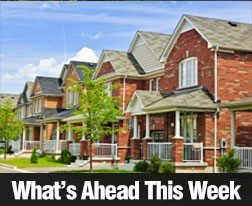What’s Ahead For Mortgage Rates This Week – April 25, 2016

Last week’s economic releases included Existing Home Sales, Commerce Department Releases on Housing Starts and Building Permits and the National Association of Home Builders/Wells Fargo Housing Market Index. Mortgage rates and new jobless claims were released according to their weekly schedule.
Home Builder Confidence Holds Firm in April
According to April’s National Association of Home Builders/Wells Fargo Housing Market Index, home builder confidence held steady with a reading of 58 for the third consecutive month. Analysts viewed April’s reading as a sign of steady expansion for home building, but builders noted concerns over labor shortages. NAHB Chief Economist Robert Dietz said that builders were “cautiously optimistic” concerning housing market conditions.
The National Association of Realtors® reported a jump in sales of previously owned homes in March. The seasonally-adjusted annual rate of sales rose to 5.33 million and surpassed expectations of 5.30 million sales and February’s reading of 5.07 million sales of pre-owned homes.Mr. Lawrence Yun, chief economist for NAR, said that demand is increasing and noted that the national average home price increased more than twice as fast as average wages.
In other housing-related reports, the Commerce department reported slower growth in housing starts, which reached 1.089 million starts in March. Analysts expected 1.170 million starts based on March’s reading of 1.194 housing starts. Building permits were also lower with 1.086 million building permits issued as compared to 1.177 million building permits issued in March.
National Association of Realtors®: Sales of Pre–Owned Homes Exceed Expectations
March sales of previously owned homes reached a seasonally-adjusted annual rate of 5.33 million sales against predictions of 5.30 million sales and February’s reading of 5.07 million sales. While March sales of pre-owned homes coincide with the approaching peak home selling season, high demand for homes and low supplies of homes for sale could slow sales. Inventories of available homes are currently at a 4.5 month supply; a six month supply of available homes indicates a normal reading for available homes.
Mortgage Rates Mixed, Jobless Claims Lowest Since 1973
Freddie Mac reported mixed results for last week’s average mortgage rates. The rate for a 30-year fixed rate mortgage was one basis point higher at 3.59 percent. The rate for a 15-year fixed rate mortgage was one basis point lower at 2.85 percent while the average rate for 5/1 adjustable rate mortgages fell by three basis points to 2.81 percent. Discount points averaged 0.60 percent for fixed rate mortgages and 0.50 percent for 5/1 adjustable rate mortgages.
Weekly jobless claims dropped to their lowest level since 1973 with a reading of 247,000 new claims filed. Analysts expected a reading of 265,000 new claims filed based on the prior week’s reading of 253,000 new claims filed. Strong labor markets can be an incentive to home buyers to move up to larger homes or transition from renting to owning, but short supplies of available homes and rapidly rising home prices present obstacles. First-time buyers account for approximately 30 percent of home sales; their participation could diminish unless available homes increase and demand for homes eases.
What‘s Ahead
This week’s scheduled economic reports include the S&P Case-Shiller Home Price Indices along with new and pending home sales reports. Weekly reports on mortgage rates and new jobless claims will be released on schedule.

 One of the more common methods that home loan applicants use to find the best loan program available is to compare interest rates, but choosing the lowest rate possible is not always the best option available. In fact, in some cases, it may be one of the least advantageous options when all factors are considered. With a closer look, home mortgage applicants may decide to review other factors in combination with the interest rate to make a more informed decision when applying for a new loan.
One of the more common methods that home loan applicants use to find the best loan program available is to compare interest rates, but choosing the lowest rate possible is not always the best option available. In fact, in some cases, it may be one of the least advantageous options when all factors are considered. With a closer look, home mortgage applicants may decide to review other factors in combination with the interest rate to make a more informed decision when applying for a new loan. When applying for a new home mortgage, many loan applicants initially consider applying for a 30-year fixed rate mortgage. This is perhaps the most common and traditional type of mortgage available. It allows you to enjoy the opportunity to pay for your home over the course of 30 years with equal payments every month. While this is one option, there are actually multiple choices available. For some applications, a variable rate mortgage may be more advantageous. If you are comparing the options between a fixed rate and a variable rate mortgage, you may consider a few points.
When applying for a new home mortgage, many loan applicants initially consider applying for a 30-year fixed rate mortgage. This is perhaps the most common and traditional type of mortgage available. It allows you to enjoy the opportunity to pay for your home over the course of 30 years with equal payments every month. While this is one option, there are actually multiple choices available. For some applications, a variable rate mortgage may be more advantageous. If you are comparing the options between a fixed rate and a variable rate mortgage, you may consider a few points.